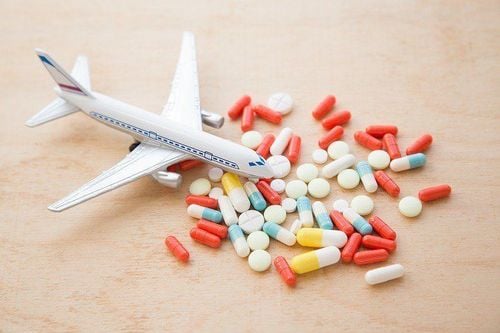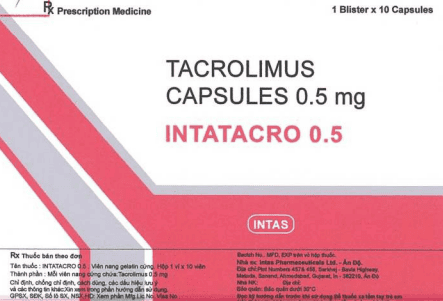This is an automatically translated article.
Atgam is a prescription drug classified under the class of immunosuppressants or polyclonal antibodies. Extracted from horse protein, used to treat the symptoms of kidney failure and aplastic anemia. So to find out what Atgam drug works?
1. Effects of Atgam
Atgam is a polyclonal antibody or an immunoglobulin, given intravenously (IV, into a vein). Atgam is used against a type of white blood cell called a T lymphocyte (also known as a thymocyte or a T cell). T lymphocytes are part of the immune system. In some blood disorders (aplastic anemia, Myelodysplastic syndrome [MDS]), T lymphocytes can attack your bone marrow by mistake. This makes it harder for your bone marrow to make healthy blood cells. Atgam slows or stops T lymphocytes from attacking the bone marrow so your blood can make the cells it needs.
Atgam is made by taking donated human white blood cells (T lymphocytes) and injecting it into a horse. Horse blood makes its own antibodies (a type of protein in the blood) against these T lymphocytes. These antibodies are then taken from the horse's blood and made into Atgam. When Atgam is infused into a patient, that person's body can take the antibodies (made by horses) and use them to slow or stop their own T lymphocytes from attacking the bone marrow.
2. How to use Atgam
Atgam is given intravenously (IV, into a vein), usually in a hospital. You will need to be closely monitored during the infusion, which can take several hours.
One of the most common side effects of Atgam is an allergic reaction. Your healthcare team may perform a “skin test” before you receive the infusion to see if you may be allergic to Atgam. Your doctor will inject a small amount of Atgam into your skin and monitor your skin's reaction. Depending on these results, you may be given medication before the infusion to stop or reduce the allergic reaction. These include steroids (methylprednisolone), H1-receptor antagonists (diphenhydramine), and antipyretics (acetaminophen).
When the infusion is started, you will be closely monitored for any signs of an allergic reaction or any other side effects. Your blood pressure, temperature, and pulse oximetry (blood oxygen level) will be checked several times.
3. Contraindications of Atgam
Atgam drug is contraindicated for patients who are sensitive to the ingredients of the drug.
4. Notes when using Atgam
If you are allergic to lymphocyte immune globulin, horse protein, or any other part of Atgam (anti-blood (horse) cell globulin). if you are allergic to Atgam (anti-blood cell (horse) globulin); any part of Atgam (anti-blood cell (horse) globulin); or any other drug, food or substance. Tell your doctor about your allergies and symptoms you have. If you are breast-feeding or planning to breast-feed, tell your doctor. You have a higher risk of getting an infection. So wash your hands often. Stay away from people with infections, colds or flu. You may be more prone to bleeding, so be careful and avoid injury. Use a soft toothbrush and razor. Atgam is made from your plasma (part of your blood) and may contain the virus that causes the disease. However, the drug has been screened, tested, and treated to reduce the risk of infection. Therefore, if you have any questions, talk to your doctor. Tell your doctor if you are pregnant or plan to become pregnant. You will need to talk about the benefits and risks of using Atgam (anti-blood cell (horse) globulin) while you are pregnant. This medicine may interact with other drugs or have health problems.
Tell your doctor and pharmacist about all of your medicines (prescription or OTC, natural products, vitamins) and health problems. Patients should check to make sure that it is safe to take Atgam (antithymocyte globulin (horse)) for all medications and health problems. Do not start, stop, or change the dose of any medicine without checking with your doctor.
5. Side effects of Atgam
Although it may be rare, some people can experience very severe and sometimes fatal side effects when taking the medicine. Tell your doctor or get medical help right away if you have any of the following signs or symptoms that may be related to a very bad side effect:
Signs of an allergic reaction such as: rash; hives; itchy; red, swollen, blistering, or peeling skin with or without fever; wheeze; chest or throat tightness; trouble breathing , trouble swallowing or talking; unusual hoarseness; or swelling of the mouth, face, lips, tongue, or throat. Signs of infection such as fever, chills, very severe sore throat, ear or sinus pain, cough, increased sputum or change in color of sputum, pain when urinating, mouth sores, or wounds that don't heal. Fast or slow heart rate. Short of breath. Very bad dizziness or go out. Any unexplained bruising or bleeding. Swelling. Sweat a lot. Muscle pain. Diarrhea. Stomachache. All drugs can cause side effects. However, many people experience no side effects or only minor side effects. Call your doctor or get medical help if any of these or any other side effects bother you or do not go away such as: Headache, joint pain.
These are not all possible side effects. If you have questions about side effects, call your doctor for advice.
6. How to store Atgam
Do not share drugs with others and do not take other people's medicines. Keep all medications in a safe place. Keep all medications out of the reach of children and pets. Throw away unused or expired medication. Do not flush down the toilet or down the drain unless you are told to do so. Check with your pharmacist if you have questions about the best way to get rid of drugs. Atgam is a prescription drug classified under the class of immunosuppressants or polyclonal antibodies. Extracted from horse protein, used to treat the symptoms of kidney failure and aplastic anemia.
Follow Vinmec International General Hospital website to get more health, nutrition and beauty information to protect the health of yourself and your loved ones in your family.
Please dial HOTLINE for more information or register for an appointment HERE. Download MyVinmec app to make appointments faster and to manage your bookings easily.
References: .rxlist.com, oncolink.org













